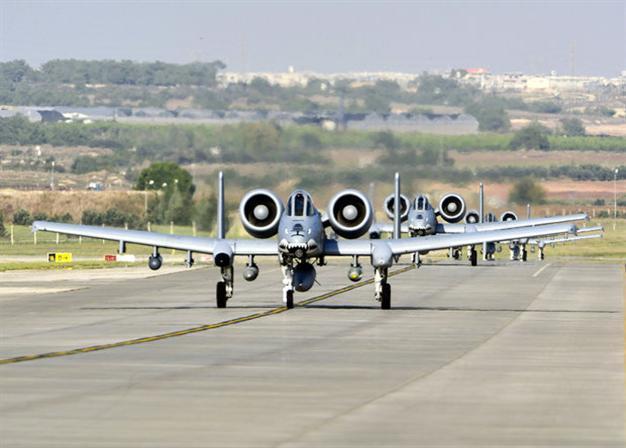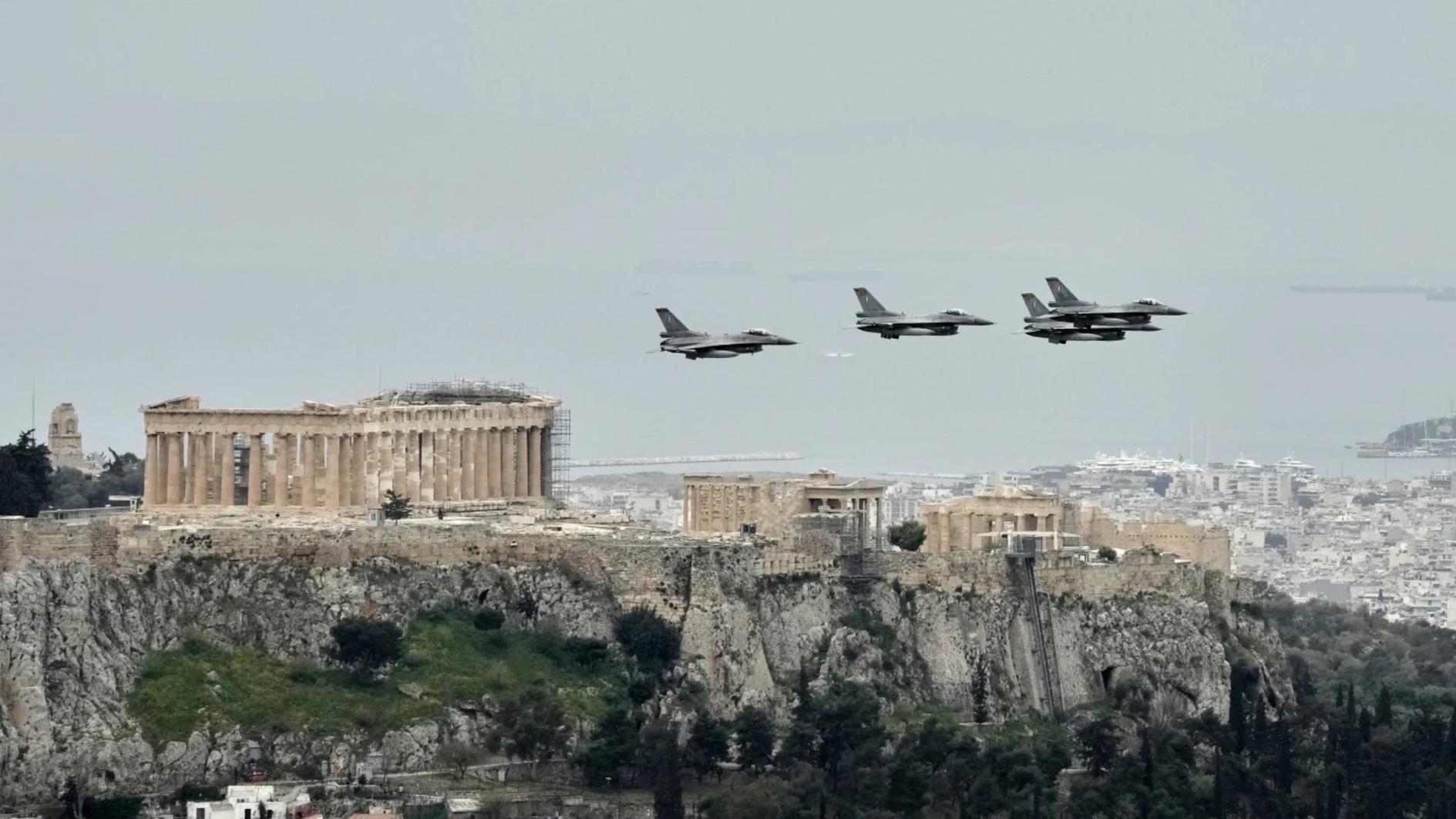UK assures Turkey of NATO support
Serkan Demirtaş - ANKARA

DHA photo
One of Turkey’s most prominent allies, the United Kingdom, has underlined NATO should play a key role in providing further measures of assurance to Turkey in the face of regional challenges, especially in regard to the deepening Syrian crisis.“NATO Secretary-General [Jens] Stoltenberg recently emphasized NATO’s solidarity with Turkey and we endorse that position. NATO is the cornerstone of European defense. The alliance must play a key role in leading further assurance measures for Turkey, and in deterring further unhelpful behavior from Russia toward Turkey and the south,” U.K. Secretary of Defense Michael Fallon told daily Hürriyet in an interview on Nov. 12 before meetings in Ankara.
“Although we cannot preempt a NATO decision, allies are currently considering how best to provide support and reassurance, building on the measures already in place. The U.K. is firmly committed to supporting Turkey and we stand ready to consider any NATO request,” he added.
Fallon will hold talks with Defense Minister Vecdi Gönül along with other senior Turkish officials about the ongoing Syrian unrest, as well as bilateral defense issues. Here is the full text of the interview:
The Syrian unrest will soon turn in its fifth year with no hopes for a quick settlement that would reinstate peace and stability in the entire region. In addition, it produced a global terrorism problem under the Islamic State of Iraq and the Levant (ISIL). What is your projection for both the future of Syria and of the fight against ISIL? Do you think the international community will be able to defeat this growing extremist terrorism while keeping Syria united?
Both in its scale and its duration, the Syrian conflict has become one of the greatest tragedies of this century. It is perpetuated by the [Bashar] al-Assad regime on the one hand and ISIL and other extremist groups on the other. And anyone in the wider world who felt they could turn a blind eye to this conflict now realizes that no one is immune from its consequences. But there is hope. In Syria itself, moderate opposition groups continue to defend their homes and their country. We will continue to work with Turkey in the global coalition to support these groups in the fight against terrorism. In Iraq, supported by the coalition, the Iraqi Security Forces have now forced ISIL onto the defensive. Diplomatically, we will continue to promote a sustainable political solution for a unified Syria, free of al-Assad’s baneful influence, which is the only long-term guarantee that groups such as ISIL will be eradicated.
Does the UK let down its allies?
As one of the important partners of the global anti-ISIL coalition, could you please detail the level of the U.K.’s military involvement in this fight? Do you agree with Gen. Nicholas Houghton’s description that the U.K. is letting allies down by not being a full player in this fight?
General Houghton was referring to the fact that we are conducting strikes against ISIL in Iraq but we do not have permission from our parliament to do so in Syria. He is right that this is illogical. ISIL is headquartered in Raqqa and does not respect international boundaries. Raqqa is where its financial and administrative operations are run from. It’s training camps are, for the most part, located in eastern Syria. This is where its illicit oil industry operates which helps funds its operations and attract and pay its thousands of foreign fighters.
Despite this, the U.K. is playing a leading role in terms of strike operations against ISIL in Iraq, hitting ISIL commanders, weapons systems, disrupting their lines of communication, supporting ground offensives by the Iraqi Security Forces, and leading the Coalition Counter IED training program to the Iraqis. We are already conducting sophisticated intelligence and surveillance flights over Syria on behalf of the coalition. Ultimately though, we should also be striking ISIL in Syria and my intention is to build support across our parliament for that.
There are thoughts about pushing regional Islamic countries to play the lead role in the fight against ISIL. Is it an opinion the U.K. shares? And if yes, which countries should be involved and why?
We understand that our NATO ally Turkey and other regional partners have also borne the brunt of the conflict, both through the inflow of massive numbers of refugees and in the form of terrible terrorist incidents, most recently in Ankara itself. We recognize that in many cases these countries have insight and contacts which will be essential in building a peaceful future for the region. Of course, there are numerous Muslim-populated countries already playing a full part in the campaign against ISIL. In terms of experience and capabilities, the U.S. and other NATO allies can bring important resources to this fight. This will be a joint enterprise and we welcome all those genuinely committed to defeating this vile threat.
UK considers using Turkish bases
In the event the U.K. decides to strike ISIL positions in Syria, would your government consider using Turkish air bases and/or airspace?
We are grateful for Turkey’s offer to provide basing facilities for counter-ISIL operations and we are keeping this under consideration. We recognize it has the potential to help the campaign against ISIL, and we also understand the need to offer full support to Turkey in the face of incursions into its airspace by Russian and al-Assad regime aircraft.
As close allies, how would you grade the cooperation between Turkey and the U.K. in the fight against ISIL and stopping British nationals’ foreign fighters from infiltrating into Syria? Can you provide figures?
We work closely with our Turkish counterparts to prevent U.K. nationals from joining the conflict in Syria. I can’t give you precise figures, as this is sensitive information. However, disrupting the flow of foreign fighters is a crucial part of the fight against ISIL, so we value greatly the efforts of the Turkish authorities on this matter. Turkey’s role in the counter-ISIL Foreign Terrorist Fighters Working Group and in the Global Counter Terrorism Forum (GCTF) are also important contributions in bringing the international community together to address these issues.
Of course it is not Turkey’s responsibility alone to prevent the flow of manpower and finance to ISIL. For its part, the U.K. has responded by introducing comprehensive legislation in the form of the Counter Terrorism and Security Act 2015 to strengthen our powers to intercept those we suspect of seeking to travel to join ISIL. These include the power to seize a passport at the border and giving parents the ability to apply for their children’s passports to be removed if they are under 18 years old. We have also released a new counter-extremism strategy, a value-based approach which seeks to address extremism in all its forms.
PKK should cease attacks
Turkey is heavily fighting the Kurdistan Workers’ Party (PKK) both in Turkey and in northern Iraq. As a country already cooperating with Turkey in its fight against the PKK, what is your response to the Turkish government’s request for more support from its allies? What additional measures is the U.K. taking, especially for the eradication of financial sources of the PKK?
The PKK is proscribed as a terrorist organization in the U.K. We condemn its recent attacks in Turkey, as we condemn all terrorism. Our thoughts are with the families of those killed. We support Turkey’s right to defend itself against PKK attacks and have called on the PKK to cease this violence. We support a resumption of the peace process, in the interests of Turkey and the wider region. The U.K. stands ready to help in any way we can.
UK ready to lend help for peace process
How do you evaluate the end of the Kurdish peace process and the resumption of violence as a country that was able to resolve a similar problem in the past through dialogue?
We want to see the peace process resumed, in the interests of Turkey and the wider region. We have already shared lessons learned from the U.K.’s experience in Northern Ireland with senior Turkish ministers, politicians and officials. We are ready to lend further assistance if asked. A peaceful resolution to the Kurdish issue would significantly enhance the stability and prosperity of Turkey and the wider region.
Categorized as an affiliate of the PKK in Syria, Turkey sees the Democratic Union Party (PYD) and its armed wing as terrorist organizations and wants to see its allies consider it in the same way. Is the U.K. considering designating the PYD a terrorist organization? How does the U.K. value the PYD’s role in fighting against ISIL along with the international coalition?
The People’s Protection Units (PYD/YPG) are fighting ISIL. But we do have concerns about how the PYD administers the areas under their control. Amnesty International’s report from Oct. 13 highlighted the deliberate demolition of civilian homes and forced displacement of Arab, Turkmen and Kurds civilians by the PYD. This is unacceptable. We want the PYD to support inclusive governance for all peoples living in areas under their control. This should include allowing other Syrian Kurdish opposition parties to operate freely.
NATO should play key role
Could you elaborate on the current level of bilateral defense and defense industry cooperation?
NATO’s secretary-general, Stoltenberg, recently emphasized NATO’s solidarity with Turkey, and we endorse that position. NATO is the cornerstone of European defense: the alliance must play a key role in leading further assurance measures for Turkey, and in deterring further unhelpful behavior from Russia toward Turkey and the south. Although we cannot preempt a NATO decision, allies are currently considering how best to provide support and reassurance, building on the measures already in place. The U.K. is firmly committed to supporting Turkey and we stand ready to consider any NATO request. Our bilateral defense relationship with Turkey is already very good. We meet regularly at senior levels; share intelligence; undertake joint training and are increasingly active in terms of defense industrial cooperation. Turkey has never been more important to the security of the U.K. than it is today.
British companies are also investing heavily in Turkey, sharing their expertise and know-how while partnering successfully with Turkish defense companies. Rolls Royce recently signed an agreement to set up an Advanced Manufacturing Technology Centre and BAES has submitted an attractive bid to partner on Turkey’s exciting TFX indigenous fighter program.
















